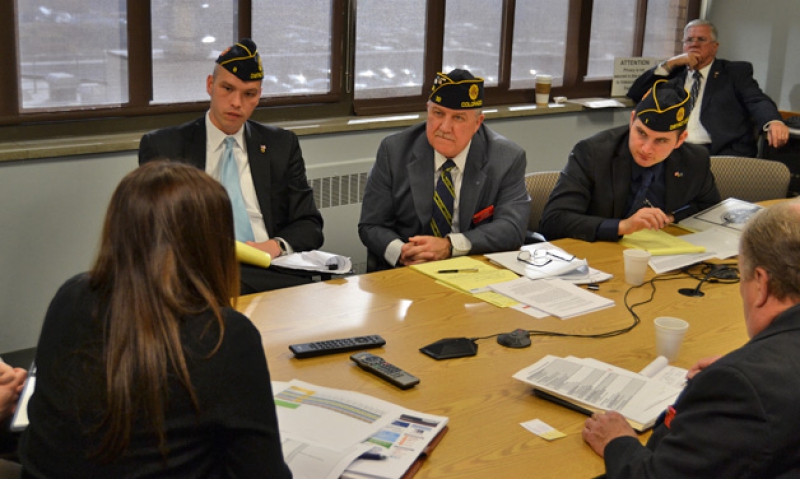
Members of The American Legion’s System Worth Saving Task Force held a town hall meeting in Pittsburgh to discuss health care, then visited the local VA facility.
Local veterans gathered at a Nov. 4 town hall meeting in Pittsburgh to share their views with The American Legion about the quality of health care they are receiving from the Department of Veterans Affairs Pittsburgh Healthcare System.
The meeting, hosted by American Legion Post 577, took place the night before System Worth Saving (SWS) Task Force members visited the VA medical center to interview administrators, staff and patients.
After Post Commander Jim Martin opened the meeting, SWS Chairman Ralph Bozella told the group that “the Legion has remained steadfast in its advocacy and support of quality health care for veterans.” He noted that, in 2003, then-National Commander of The American Legion Ron Conley - present at the meeting - founded the SWS Task Force. During his year as national commander, Conley visited more than 60 VA medical centers and compiled a report on the quality of their health care; that report was shared with VA, Congress and the White House.
“We have followed that model for the past ten years, with the same procedures,” Bozella said. “We evaluate VA hospitals by conducting site visits, with specific topics.” The topic for this new round of SWS visits is to look back at the past 10 years to see what changes and improvements have taken place in the VA system since the Legion’s SWS program began.
“As we know, in Pittsburgh, there is an issue of Legionella (bacteria), and that will be one of the things that we will discuss with the VA, but that’s not going to be the only thing,” Bozella said.
A recent outbreak of Legionella at the Pittsburgh facility claimed the lives of five patients and made 16 more seriously ill. “We will also discuss issues like budgeting, outreach, veterans safety, quality of health care, construction - there’s a variety of things that we’re going to be looking at,” Bozella said.
Rep. Mike Doyle, D-Pa., also addressed the audience. “We’re here to listen and learn, and to work with you to do the best job we can for our veterans,” Doyle said. Doyle told the crowd that his father was a veteran with a 100-percent service-connected disability who was treated at VA hospitals, and his brother, Pat, has worked 33 years for the VA. “And the first assignment that I sought going to Congress was on the veterans’ affairs committee, because our family felt the need to give back to the veterans, and the disabled veterans, and the VA system that was so good to my dad when he had his problems.”
The evening’s discussion was guided by Jacob Gadd and Ed Lilley, representatives of the Legion’s national staff. Topics included the Legionella outbreak, VA enrollment and outreach, mental health services, the hospital’s intensive care unit, long-term care, programs for homeless veterans, information technology and construction.
“Obviously, we’re very concerned about the Legionella outbreak,” Gadd said, “The public wasn’t informed of the dangers of the Legionella bacteria for over a month after the (Centers for Disease Control) was brought in. Veterans need to know that the VA health-care system is a safe place, where they can receive treatment and know that patient safety is a top priority. We want to understand what new processes and solutions (VA) will take to eradicate and prevent future occurrences.”
According to Terry Wolf, the Pittsburgh VA facility’s director, several mechanisms have been put into place to prevent any further outbreak of Legionella, including the creation of a water safety committee and a regional coalition of health-related organizations to improve Legionella testing procedures. Wolf said the Pittsburgh facility now has the most stringent procedure for Legionella testing among all VA hospitals nationwide.
Lilley asked the audience to comment on the Pittsburgh hospital’s intensive care unit (ICU) and got a response from Dr. Victor Yu, professor of medicine at the University of Pittsburgh and former chief of infectious diseases at the Pittsburgh VA facility. He said that all ICUs in the VA system “are one of the best services in the United States. The transplant service is state of the art.” He said the mortality rate for ICU patients at the Pittsburgh VA were about half of the rate at a highly regarded private-sector hospital in the city.
“There are many wonderful things about VA. You can actually go there and expect tremendous care,” Yu said. “So I want to give all of you some confidence - for the physicians, nurses, and the delivery of health care - I think you can feel confident. When you get there, the physicians and nurses are at the top of the system.”
During its Nov. 5 site visit to the Pittsburgh facility, the SWS team interviewed a variety of staff members, including Wolf, chief of staff Dr. Ali Sonel, deputy director David Cord, human resources officer Amber Mesoras, community outreach coordinator Heather Steele, patient advocate Elizabeth Marinella, chief financial officer Chuck Thilges, program management officer Sandy Craven, and director of quality and patient safety Anita Steinmiller.
The Pittsburgh trip was the SWS Task Force’s first stop in a six-month itinerary that will take it to 14 other VA medical centers in the following cities: Nashville, Tenn.; El Paso, Texas; Huntington, W.Va.; Leavenworth, Kans.; Roseburg, Ore.; Jackson, Miss.; Butler, Pa.; Atlanta, Dallas, Orlando, Fla.; Columbia, S.C.; Cleveland, Ann Arbor, Mich.; and Denver.
- Veterans Benefits

